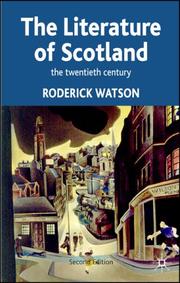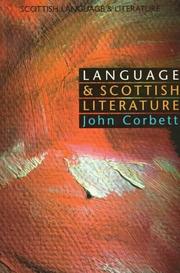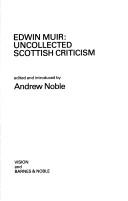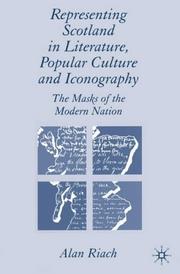| Listing 1 - 10 of 27 | << page >> |
Sort by
|

ISBN: 9780230000377 9780333666647 Year: 2007 Publisher: New York Basingstoke : Palgrave Macmillan,
Abstract | Keywords | Export | Availability | Bookmark
 Loading...
Loading...Choose an application
- Reference Manager
- EndNote
- RefWorks (Direct export to RefWorks)
Critics hailed the first edition of The Literature of Scotland as one of the most comprehensive and fascinatingly readable accounts of Scottish literature in all three of the country's languages - Gaelic, Scots and English. In this extensively revised and expanded new edition, Roderick Watson traces the lives and works of Scottish writers in a beautiful and rugged country that has been divided by political and religious conflict but united, too, by a democratic and egalitarian ideal of nationhood. The Literature of Scotland: The Twentieth Century provides a comprehensive account of the richest ever period in Scottish literary history. From The House with the Green Shutters to Trainspotting and far beyond, this companion volume to The Literature of Scotland: The Middle Ages to the Nineteenth Century gives a critical and historical context to the upsurge of writing in the languages of Scotland. Roderick Watson covers a wide range of modern and contemporary Scottish authors including: MacDiarmid, MacLean, Grassic Gibbon, Gunn, Robert Garioch, Iain Crichton Smith, Alasdair Gray, Edwin Morgan, James Kelman, Irvine Welsh, Alan Warner, A. L. Kennedy, Liz Lochhead, John Burnside, Jackie Kay, Kathleen Jamie and many, many more! Also featuring an extended list of Further Reading and a helpful chronological timeline, this is an indispensable introduction to the great variety of Scottish writing which has emerged since the start of the twentieth century.
Book
Abstract | Keywords | Export | Availability | Bookmark
 Loading...
Loading...Choose an application
- Reference Manager
- EndNote
- RefWorks (Direct export to RefWorks)
Book
ISBN: 2902709102 9782902709106 Year: 1979 Publisher: Grenoble: Publ. de l'Université des langues et lettres,
Abstract | Keywords | Export | Availability | Bookmark
 Loading...
Loading...Choose an application
- Reference Manager
- EndNote
- RefWorks (Direct export to RefWorks)
Litterature ecossaise --- Litterature anglaise --- Auteurs ecossais
Book
ISBN: 9783825360139 382536013X Year: 2012 Volume: 427 Publisher: Heidelberg Universitätsverlag Winter
Abstract | Keywords | Export | Availability | Bookmark
 Loading...
Loading...Choose an application
- Reference Manager
- EndNote
- RefWorks (Direct export to RefWorks)
Scottish literature --- English literature --- Canon (Literature) --- History and criticism. --- Scottish authors --- Littérature écossaise --- Histoire et critique
Book
ISBN: 2848678763 2848677694 Year: 2021 Publisher: Besançon : Presses universitaires de Franche-Comté,
Abstract | Keywords | Export | Availability | Bookmark
 Loading...
Loading...Choose an application
- Reference Manager
- EndNote
- RefWorks (Direct export to RefWorks)
Le parcours de Mateusz Zajac, né en Galicie (Pologne) en 1919, où il a vécu jusqu’à sa mobilisation, pendant la Deuxième Guerre mondiale, a des allures d’épopée homérique. En raison du contexte historique géopolitique complexe, comme nombre de ses congénères, le jeune homme est déraciné et jeté sur les routes pour se battre sous des drapeaux différents, dans des armées de nations diverses, au gré des victoires et des défaites qui remodèlent cette partie de l’Europe de l’est. Survivre est héroïque. Dans Le Tailleur d’Inverness, la fierté et l’amour de son fils Matthew, auteur pudique, affleurent à chaque tournant d’un récit dramatique et théâtral où l’inimaginable est vécu. The journey of Mateusz Zajac, born in Galicia (Poland) in 1919, where he lived until his mobilization during the Second World War, has the appearance of a Homeric epic. Due to the complex geopolitical historical context, like many of his fellow human beings, the young man is uprooted and thrown on the roads to fight under different flags, in armies of different nations, according to the victories and defeats that are remodelling this part of Eastern Europe. Survival is heroic. In The Tailor of Inverness, the pride and love of his son Matthew, a modest author, emerge at every turn of a dramatic and theatrical story where the unimaginable is experienced.
Literature, British Isles --- Europe --- identité --- littérature écossaise --- théâtre, migration --- théâtre, migration
Periodical
Year: 1963 Publisher: [Columbia, S.C., etc.], [University of South Carolina Press, etc.]
Abstract | Keywords | Export | Availability | Bookmark
 Loading...
Loading...Choose an application
- Reference Manager
- EndNote
- RefWorks (Direct export to RefWorks)
English literature --- Scottish literature --- Littérature écossaise --- Scottish authors --- History and criticism --- Histoire et critique.

ISBN: 0748608265 9780748608263 Year: 1997 Publisher: Edinburgh Edinburgh University Press
Abstract | Keywords | Export | Availability | Bookmark
 Loading...
Loading...Choose an application
- Reference Manager
- EndNote
- RefWorks (Direct export to RefWorks)
This practical introduction to ways of using theories of language to explore different aspects of Scottish literature includes material on:varieties of Scots and Scottish English; linguistic approaches to literary studies; the grammar of texts; vocabulary; metaphor; poetic metre; language in use; point of view; narrative; stereotypes of the Scots; discourse; and reading older Scottish texts. Extensive examples demonstrate the application of the theories, from poems and ballads to a football report, and from short stories to extracts from film scripts and plays.
English literature --- English language --- Dialectology --- Littérature écossaise --- Écossais (langue germanique) --- Anglais (langue) --- Histoire et critique --- Écosse (GB)

ISBN: 0389202029 Year: 1982
Abstract | Keywords | Export | Availability | Bookmark
 Loading...
Loading...Choose an application
- Reference Manager
- EndNote
- RefWorks (Direct export to RefWorks)
Scottish literature --- Littérature écossaise --- History and criticism --- Histoire et critique --- Scotland --- Ecosse --- Littérature écossaise --- Scotland.
Book

ISBN: 284867895X 2848675802 Year: 2021 Publisher: Besançon : Presses universitaires de Franche-Comté,
Abstract | Keywords | Export | Availability | Bookmark
 Loading...
Loading...Choose an application
- Reference Manager
- EndNote
- RefWorks (Direct export to RefWorks)
Education and learning have traditionally been areas in which the national specificity has been promoted and asserted in Scotland and apparently with good reason since for several centuries the Scottish population could claim to be the most thoroughly educated in the world. This achievement was the consequence of the nation’s love affair with the transmission of basic knowledge through schooling and intellectual inquiry which started with the Reformation and culminated in the Scottish Enlightenment. As a whole, this collection aims to show some small part of the breadth of knowledge created in Scotland and disseminated in and outwith the country. This broad field of interest echoes the wider range of subjects traditionally taught in Scottish schools. It attempts to highlight what is distinctive about the Scottish approach to knowledge acquisition in general while also presenting the areas in which this endeavour overlaps with similar concerns in the rest of the world. The overall impression created is that of a country consistently confident in its ability to create useful knowledge; capable of applying that knowledge at home and of sharing it with others.
Literature, British Isles --- éducation --- littérature écossaise --- Ecosse --- histoire de l’Ecosse --- Scotland --- education --- history of Scotland --- Scottish literature

ISBN: 1403945918 Year: 2004 Publisher: Basingstoke ; New York : Palgrave Macmillan,
Abstract | Keywords | Export | Availability | Bookmark
 Loading...
Loading...Choose an application
- Reference Manager
- EndNote
- RefWorks (Direct export to RefWorks)
LITTERATURE ECOSSAISE --- CARACTERISTIQUES NATIONALES --- NATIONALISME ET LITTERATURE --- CULTURE POPULAIRE --- ECOSSE (GRANDE-BRETAGNE) --- HISTOIRE ET CRITIQUE --- ECOSSAISES --- ECOSSE --- DANS LA LITTERATURE
| Listing 1 - 10 of 27 | << page >> |
Sort by
|

 Search
Search Feedback
Feedback About UniCat
About UniCat  Help
Help News
News